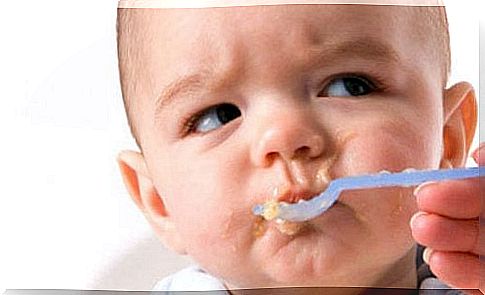My Baby Doesn’t Want To Eat: What To Do?

Healthy eating is the foundation for your baby’s development. But what happens when the baby doesn’t want to eat the foods that are offered? Below, we will present some advice for your child to eat properly.
Food is a fundamental edge in the development of any human being. However, babies often don’t want to eat and we can’t figure out why. We’ll explain some guidelines for knowing what to do when your baby doesn’t want to eat.
When analyzing the reasons why a baby does not want to eat, pediatricians suggest identifying, first, when this denial occurs.
If it has been happening forever, it may be due to some of the following reasons:
- Acid reflux: ie the baby does not produce enough acid in the stomach to process food. This problem usually resolves within the first few weeks of life. If, on the other hand, the baby produces too much acid, he will also feel pain and will cry whenever he is fed.
- Lactose rejection: occurs when the body does not produce enough lactose. This enzyme is needed to process dairy products (this is not the case with cheese and yoghurt, which are already fermented dairy products). Lactose intolerance causes intestinal pain. Remember that if your baby has this food intolerance, he will be predisposed to other food intolerances as well.
- Excessive parental expectations: the baby eats out of necessity, not obligation. It often happens that the baby already feels satisfied with a certain amount of food, but the parents insist that the little one “eats little”, when in fact the problem is not in the newborn, but in the parents’ expectations.

On the other hand, if the behavior of refusing food is new, it is important to detect the problem as soon as possible so that it can be resolved as soon as possible. The most frequent causes of this behavior are:
- Digestive problems: diarrhea, cramps, pain and even vomiting usually occur.
- Some other kind of illness. In this case, it is normal for the baby to feel less appetite. For example, if you have a fever, it is common for you to feel less craving for food.
Advice for making the baby eat
Once the causes are identified, what can we do to correct the baby’s eating habits? There are some very simple techniques that serve to shape the baby’s perception of the feeding process.
The following five factors can contribute to the construction of this perception:
- Make eating an enjoyable experience. Remember that during the first few years of life, a baby absorbs everything he perceives and relates it to something good or bad. If the feeding time takes place in a quiet environment, it will help to create a positive perception.
- Be careful with the temperature. Babies don’t know what it’s like to be cold or hot. Therefore, try to give the food at a suitable temperature for eating.
- Avoid processed foods such as honey, infusions or teas. Your baby’s body may not be prepared for this type of digestion. Choose natural foods and try to include fruits in your diet. For this, mashed apples or plain yogurt are the best alternatives.
- Be careful with hygiene, both yours and the baby’s. Hands should always be clean when handling food, as well as cutlery and plates used.
- Don’t make your baby eat things he doesn’t like. He is experiencing new flavors and textures all the time. Just because you don’t like a fruit or vegetable from an early age doesn’t mean you won’t eat it for the rest of your life. Give your child time and look for other alternatives.
When is the time for the baby to start eating foods other than milk?
From 4 or 6 months onwards, babies can be offered other types of food, especially fruits and vegetables. It is important to gradually include small amounts of different ingredients so that the baby can discover what flavors he likes, what he doesn’t like, what temperature is best (whether hot or cold) and all issues related to baby’s feeding.

The World Health Organization recommends that breast milk be the exclusive form of food until the first six months of age. Thereafter, it is appropriate to include age-appropriate foods that are safe for the baby. Let’s not forget that little teeth haven’t emerged yet, so babies still can’t chew.
We recommend that you try offering mashed potatoes or vegetables, apple or pear jam and orange juice, among other healthy and natural possibilities.
Is it necessary to consult a specialist when the baby does not want to eat?
Again, we are back to the starting point. It’s extremely important not to worry too much and to be able to identify the reasons why your baby doesn’t want to eat. It could be something circumstantial or maybe the problem is the food, or the preparation. But if your baby has symptoms that deserve attention, or if this behavior lasts for a while, don’t hesitate to see a doctor.









